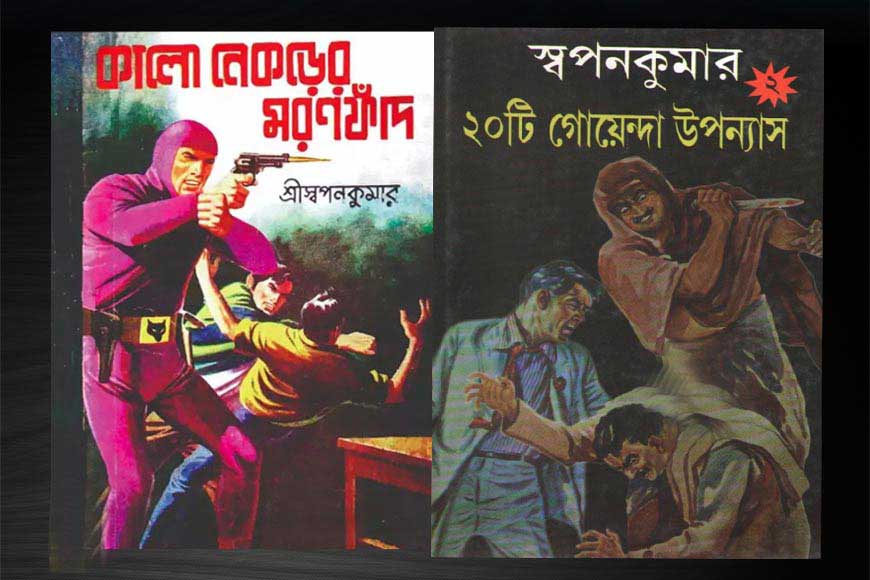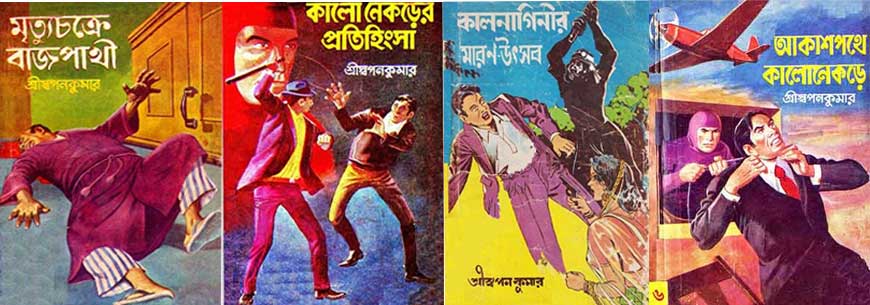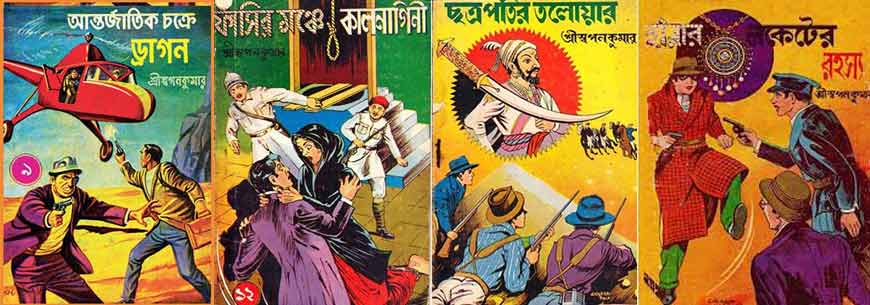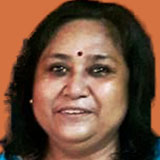Detective Deepak Chatterjee & Swapan Kumar: Poster Boys of Bengal

Samarendranath Pandey, under the pen name Swapan Kumar, created the fictional detective Dipak Chatterjee.
Trained in intelligence and martial arts, a sharpshooter with an impeccable command of firing a pistol at the target flawlessly, the superspy was cool and savvy; he thwarted conspiracies and brought international gangsters to justice. He was, in some edge-of-the-seat moments, described to be carrying two pistols in both hands and a dagger! That was super-sleuth and mega-star of Bengali pulp fiction, Dipak Chatterjee, who reigned supreme in the world of adventure and detective novels for three decades, from the 1960s to the 1980s. His incredible exploits and spectacular encounters with deadly villains and vamps like Baaj Pakhi (The Eagle), Kaal-Nagini (The Queen Cobra) and Dasyus (master villains) like Dragon and Kaalrudra were in a way, a forerunner of B and C-grade Bollywood action potboilers, spiced with crude fantasies. The fictional sleuth was the creation of Swapan Kumar, ‘the poster boy of Bangla literature’s counter-culture in his time,’ who did not follow any structured approach of storytelling knitted by some sort of narrative logic, save the logicalities of actions described. He, in fact, did not care much about, or should we say, could not afford to indulge the time to hone these academic finer points.
Churning out detective stories by the dozen was only one of Swapan Kumar’s daily chores. Swapan Kumar was a pseudonym and he used several of these including Shri Bhrigu and Dr. S. N. Pandey for curating books and journals on diverse subjects. He was a man of many parts. A renowned practicing astrologer, he wrote several pioneering books on astrology as Sri Bhrigu, which were a rage during his time. He was revered and believers used to swear by his prodigious predictions. He also wrote critically acclaimed books on medical science including Practice Of Medicine, Homeopathic Practice Of Medicine, Combo Of Gynecology Shiksha and Physiology Shiksha, Anatomy Shiksha, Physiology Shiksha, Modern Allopathic Chikitsha, Home Nursing Shiksha, Dhatrividya, Gynecology Shiksha (all written in Bengali). These books are still very popular with niche readers. He wrote over 30 ‘do-it-yourself’ manuals from as diverse spheres as learning to play the harmonium, making transistors the easy way, rearing poultry farms, growing vegetables in the kitchen garden, or detailed instructions to learn driving in a week! He was also a deft translator and many publishers exploited his skills without giving credit for his work, leave alone his remuneration. He was Dr. Samarendranath Pandey, whose life’s journey itself was full of peaks and valleys, volatile and adventurous that he could himself be the protagonist of a novel.
 Some of Swapan Kumar's detective series
Some of Swapan Kumar's detective series
In fact, Samarendranath Pandey aka Dr. SN Pandey, aka Swapan Kumar aka Shri Bhrigu, struggled with starvation and financial distress throughout his life. He hailed from an erudite Kanwakubja Brahmin family of lawyers well settled in Rajshahi, now in Bangladesh. He came to Calcutta at the age of 14 and eventually decided to study medicine at R.G. Kar Medical College and Hospital. When he was in his 2nd year in college, he received a mail from his family informing him to arrange money for his college fee and other miscellaneous expenses since it was not possible to fund his medical education any more. Pandey was shattered. He swung from emotional numbness to overwhelming fear and back again. However, being a born fighter and a fiercely upright and honourable man, Pandey took to writing fiction. He was compelled to be a prolific author who would churn out one mystery story after another, often working on multiple stories simultaneously for different publishers.
That is how Detective Deepak Chatterjee's stories were conceived. The contents of these stories were the stuff of fantastic adventures with countless improbable flaws but they were all overlooked or ignored by readers as the pace of the narrative did not offer much of a breather to brood over them. When India gained independence in 1947, Bengal was partitioned along religious lines. Crime fiction arguably offers more by way of representative social history. Moving away from structural approaches frees up the interpretative space for reading the genre. Often, the lines between fantasy and reality intersect so intricately that it is impossible to separate them. Again, when viewed through moral, heroic, or emotional filters, the law and the outlaw can and often reverse positions to challenge acceptable codes of behavior.
Detective fiction is a very popular genre of literature in Bengal, featuring super-smart private detectives, investigators and sleuths who solve crimes and mysteries using their intellect, intuition, and deductive reasoning. The genre has a rich tradition and continues to have an undeviating following. When Pandey started churning his detective stories, Bengal was already riding high on the crest of two stalwart mainstream detective storywriters — Sharadindu Bandyopadhyay and Dr. Nihar Ranjan Gupta, with their Bymokesh and Kiriti Roy stories, respectively. Both of them were distinctly different from each other as were their styles of detection. Byomkesh was by far cerebral, while Kiriti was flamboyant and more of an action hero. Pandey was not cut out for it, nor wrote for the discerning readers either.
In the stories of a given series, Detective Deepak always succeeded in tracing the dens of crime along with their motives, but not the criminal masterminds. Each time the villains managed to hoodwink Deepak and escape after every breathtaking encounter, leaving the writer with yet another chance to churn a sequel or the next novella in the series, and often the story ended with a common sigh of frustration by Detective Deepak and police inspector, Mr. Gupta. The series concluded with these villains escaping unhurt and leaving a letter addressed to Dipak. The letter would usually read that it was not easy to catch him/her.
Dr. Pandey’s transition into the realm of astrology and then emerging as cult astrologer Sri Bhrigu is also a fascinating tale in itself. This was the time when Pandey aka Swapan Kumar had already made a name as a mystery writer and had a vast fan following. He was around 27 years old at that time and was married by now with children. One day, he went to his publisher to collect his payment. The publisher kept him waiting while he entertained a stranger who had come much later than Pandey. After waiting for hours, Pandey became impatient and demanded to know why he was made to wait for his dues when he was also a much sought-after writer.

In reply, the publisher retorted, “Anyone can write detective stories. But our respected guest here writes books on astrology and such books get us a lot of business. Here he must be given priority. This was a day of reckoning for Pandey who sat in the publisher’s office and vowed to master astrology one day and show the world. He did that too. As Shri Bhrigu, he not only restored but also popularized the ancient methods like numerology. Meanwhile, Detective Deepak Chatterjee had gained cult status and countless stories of Chatterjee’s exploits were published regularly by numerous publishing houses including renowned publishers like Deb Sahitya Kutir, Mahesh Publication, Aditya Publications et al. Pandey was a prolific writer who was ever ready to churn out on any subject literally at the drop of a hat for money. He did not require nor could he afford prep time. Hence, it is still not confirmed how many books he actually authored unanimously during his long and eventful writing career. He never bothered about copyrights and wrote tirelessly, 24/7, to fulfill his commitments and meet the demands of his publishers.
When Pandey was writing, he had no permanent address and took shelter in the waiting room of the ever-busy Sealdah Railway station. He loitered on the streets of the city during daytime and at night, when the cacophony decreased at the station, he would sit and write all night. His publishers sent messengers to meet Pandey in the waiting room in the morning to collect the manuscript and pay him his dues. This system was very convenient for Pandey who would send the remuneration he received from the publisher to his wife in Shyamnagar to run the family expenses. He barely lived on ripe tomatoes bought from the neighbouring Baithakkhana Market. Whenever his wife lamented their lot, he assured her saying he loved eating ripe tomatoes with a dash of salt. It was a very enjoyable meal for him, he would always claim.
Pandey’s years of labour bore fruits and his books sold like hot cakes, but he died a sad man. It pained him to see his creation Deepak Kumar Chatterjee and his sidekick Ratanlal were being pushed into the dark abyss of anonymity. But why? He knew the reason as well. Since the beginning of the printing and publishing industry in Kolkata, there was a distinct vertical divide between populist books of ‘Bottala’ and College Street based publishers, who were patronized by the city’s erudite literati. The ’Bottala’ books catered to the tastes of the hoi polloi and compromised on the quality of writing, illustrations, printing, paper, binding and pricing whereas College Street ‘Boi Para’ (book market) catered to the elite. Swapan Kumar’s slim paperbacks featuring fantastic adventures of Deepak Chatterjee cost a bare 40 annas each and were highly affordable for school and college kids who grabbed and devoured every thriller as soon as they were published but Pandey could never afford to write and rewrite in leisure to rectify silly mistakes and glaring errors and write sophisticated who-dun-it. The publishers too, never bothered to polish the end product and this obviously affected the quality of the work.
A few years ago, all writings of Swapan Kumar aka Pandey were compiled and published in new editions in volumes. Curious readers might, one day, try to find out the magic formula that provided Bengalis instant entertainment for five decades. Realistic, "escapist" entertaining "pulp fiction" is still a popular genre and many authors venture into this realm, but none can reach the popularity and cult following of Swapan Kumar.










